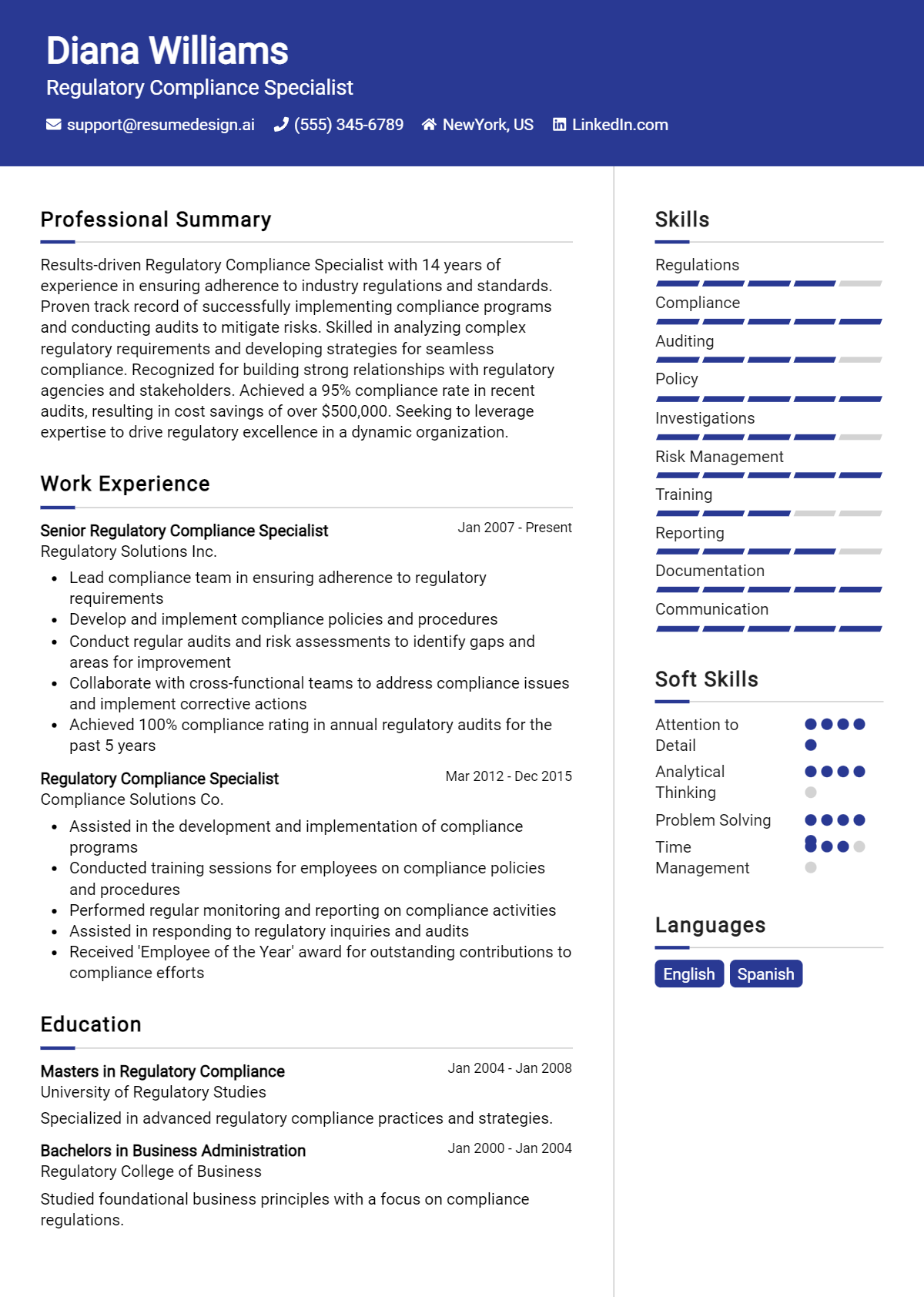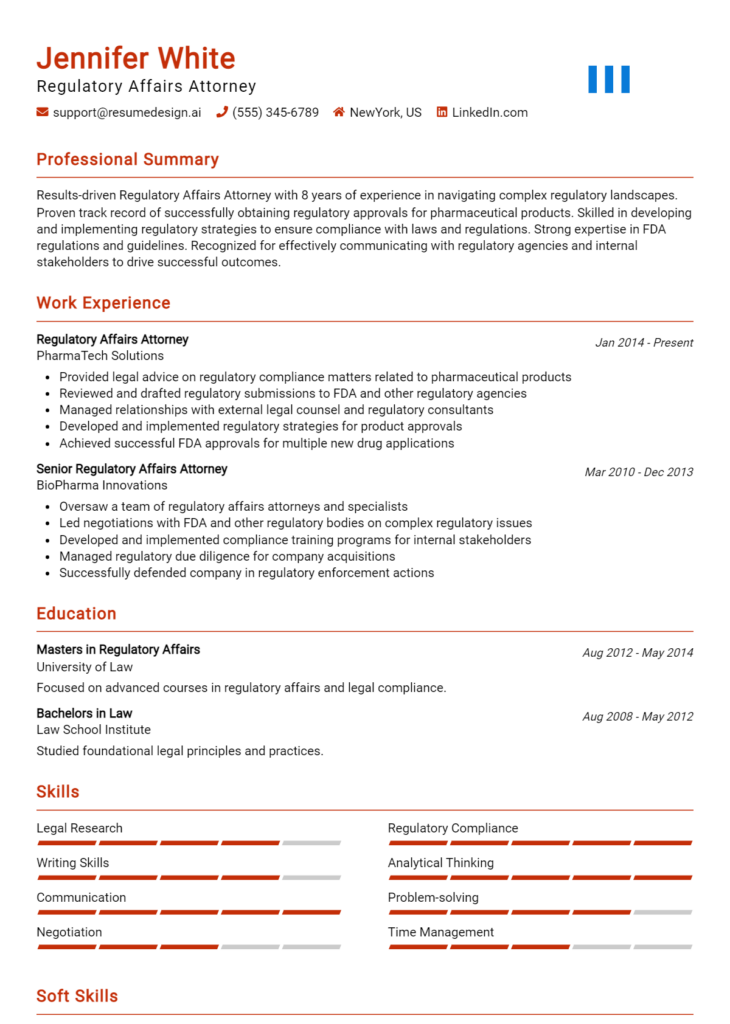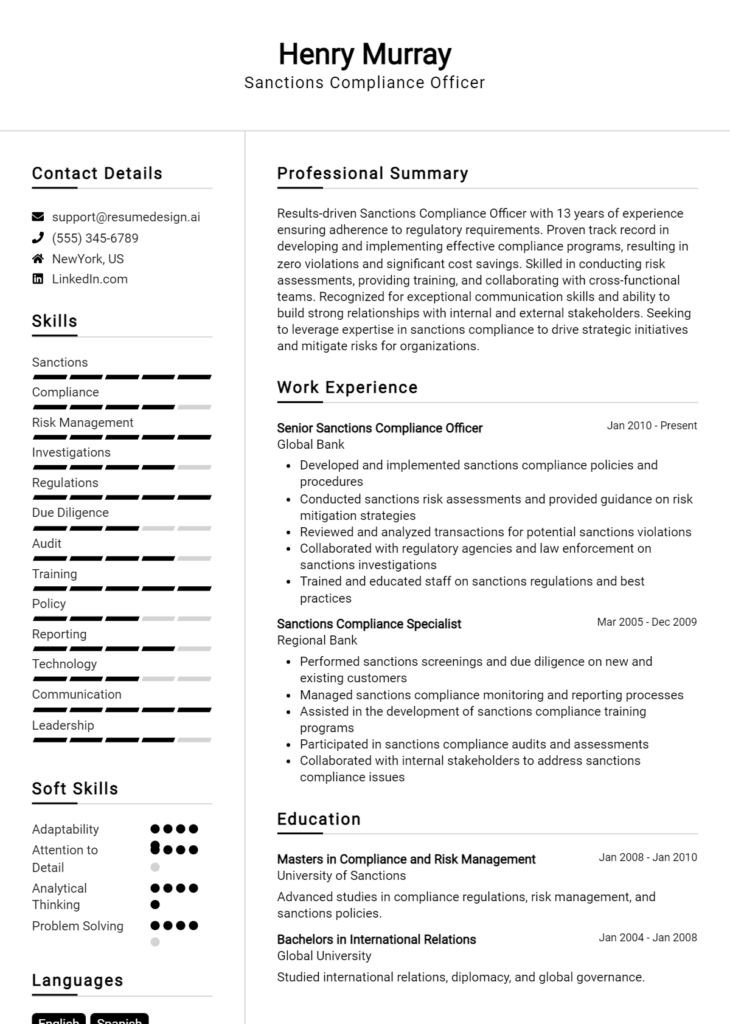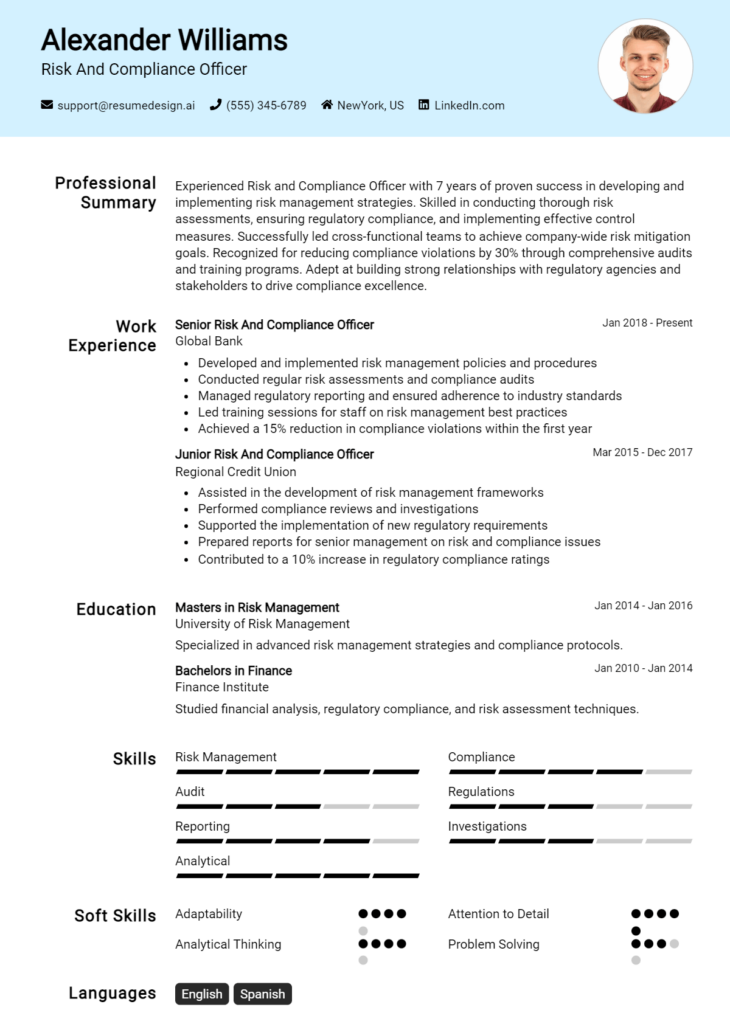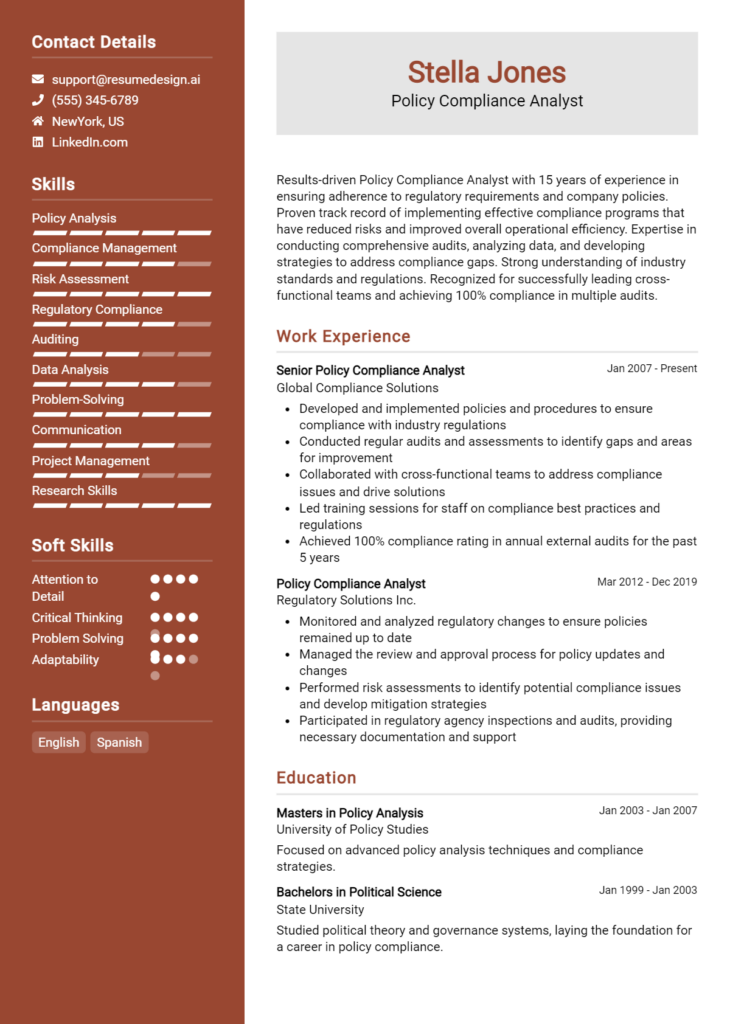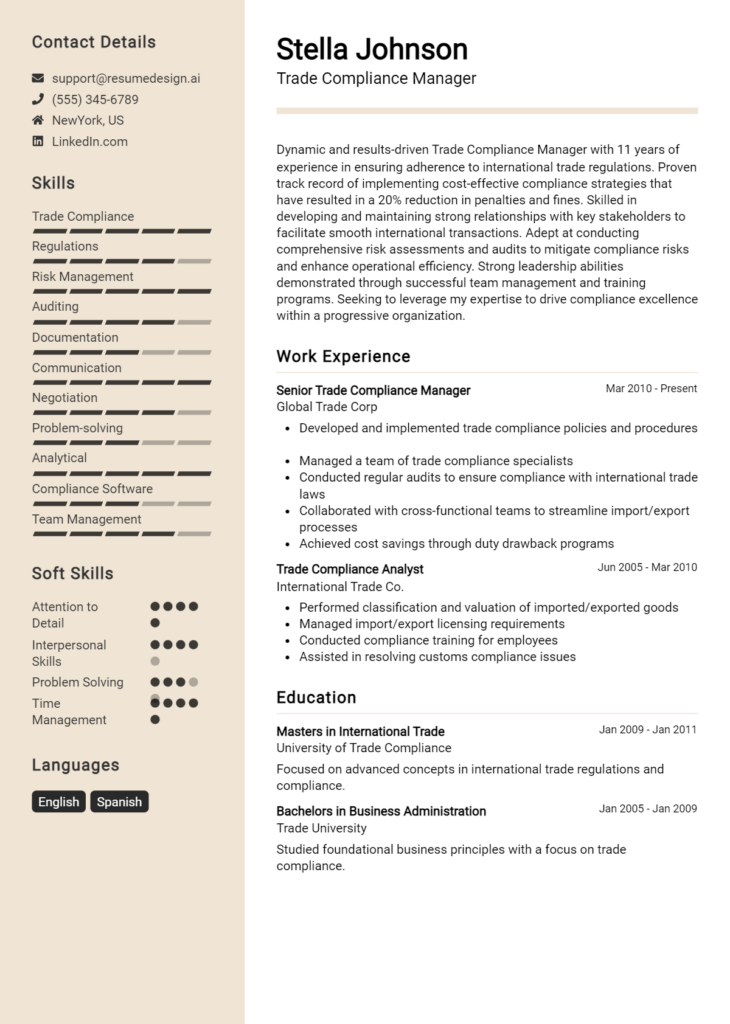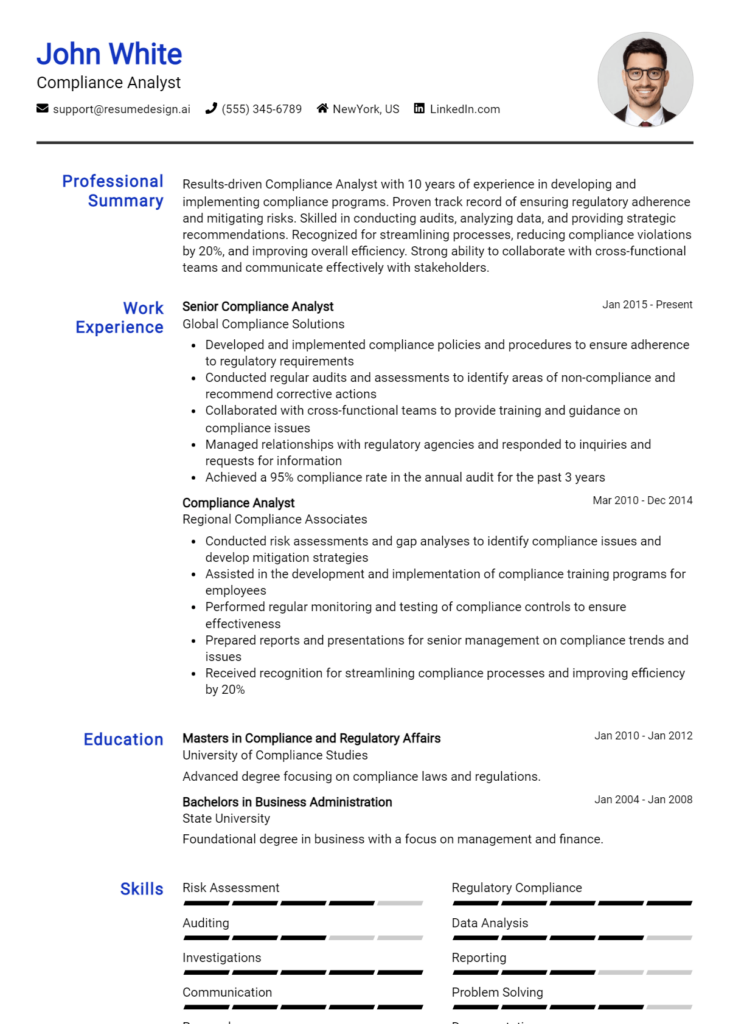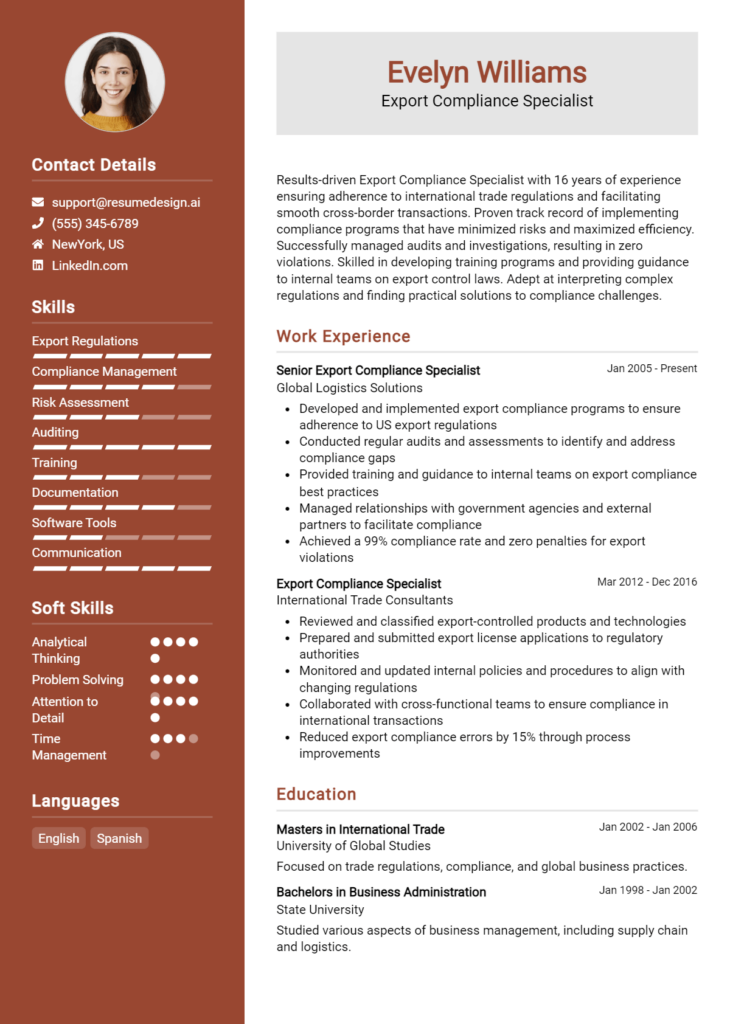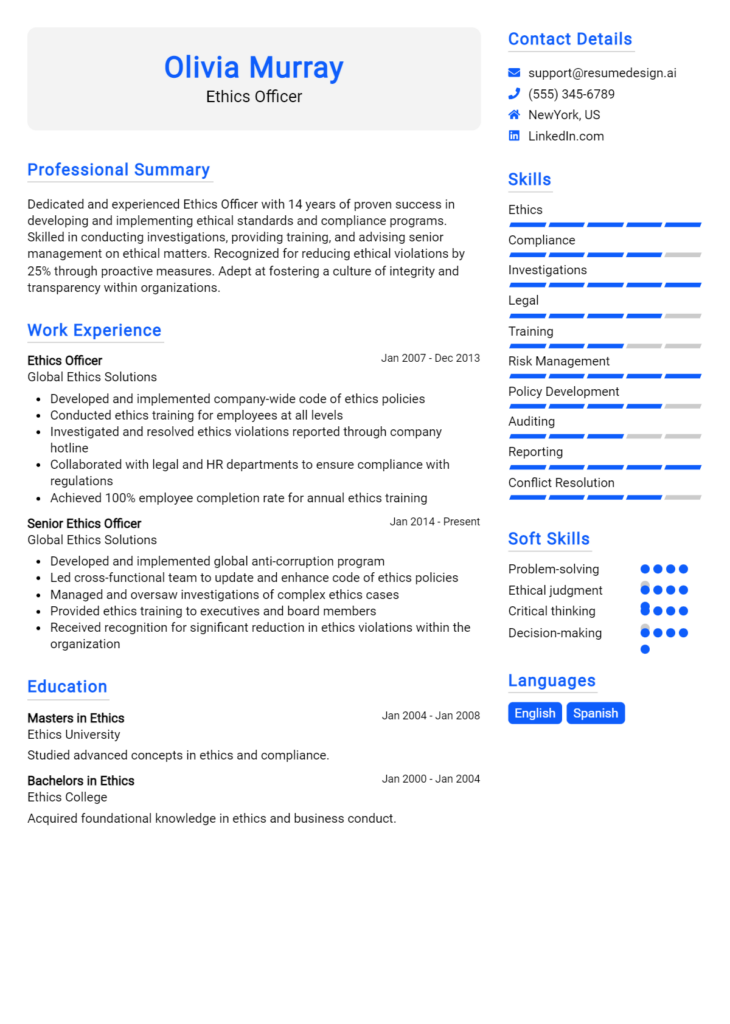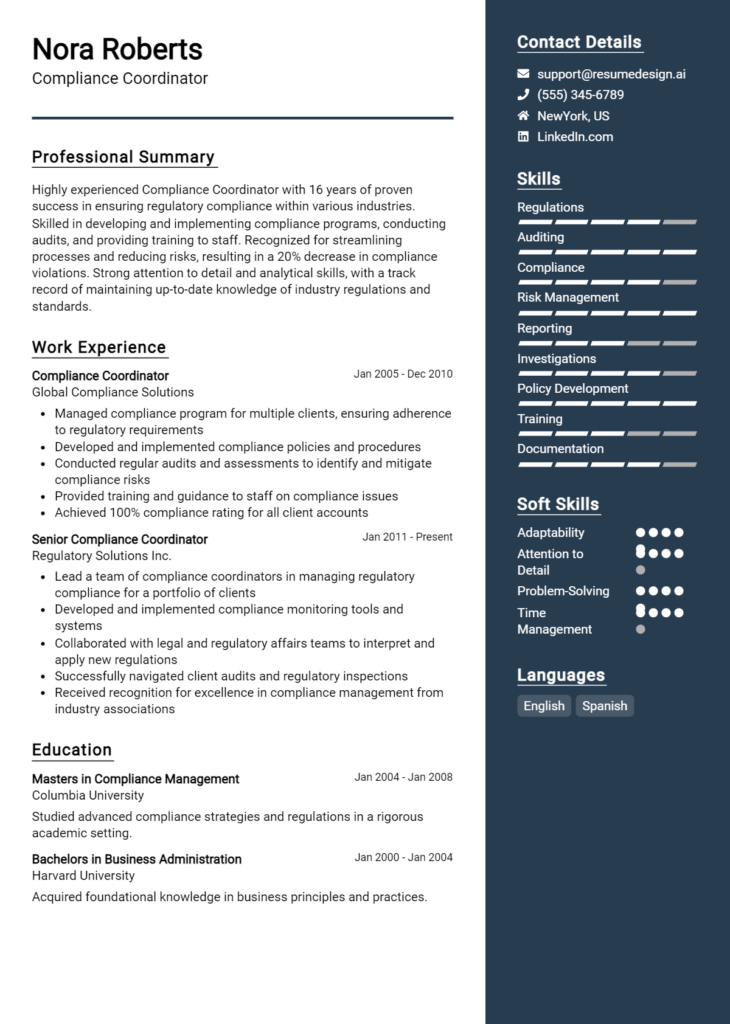SxLvaeN6JTxaKexDO8d2
Regulatory Compliance Specialist Core Responsibilities
A Regulatory Compliance Specialist plays a crucial role in ensuring that an organization adheres to legal standards and internal policies. Key responsibilities include monitoring compliance with regulations, conducting audits, and providing training to staff across various departments. Essential skills encompass technical knowledge of regulatory frameworks, operational insight, and strong problem-solving abilities. These competencies foster collaboration among teams, contributing to the organization's overall goals. A well-structured resume can effectively highlight these qualifications, showcasing the candidate’s expertise and readiness for the role.
Common Responsibilities Listed on Regulatory Compliance Specialist Resume
- Conduct regular compliance audits and assessments
- Develop and implement compliance policies and procedures
- Monitor regulatory changes and assess their impact on operations
- Provide training and support to staff regarding compliance issues
- Prepare reports for senior management and regulatory bodies
- Collaborate with legal and operational teams to mitigate risks
- Investigate compliance breaches and recommend corrective actions
- Maintain up-to-date knowledge of industry regulations and standards
- Assist in the development of compliance risk management strategies
- Ensure accurate documentation of compliance activities
- Facilitate communication between departments regarding compliance matters
High-Level Resume Tips for Regulatory Compliance Specialist Professionals
In the competitive field of regulatory compliance, a well-crafted resume serves as your first opportunity to make a lasting impression on potential employers. This crucial document not only highlights your skills and achievements but also reflects your understanding of industry standards and compliance requirements. As a Regulatory Compliance Specialist, your resume needs to effectively convey your expertise and demonstrate how you can add value to an organization. This guide will provide practical and actionable resume tips tailored specifically for Regulatory Compliance Specialist professionals, ensuring that your application stands out in a crowded job market.
Top Resume Tips for Regulatory Compliance Specialist Professionals
- Tailor your resume to align with the specific job description, incorporating relevant keywords and phrases unique to the position.
- Showcase your relevant experience by detailing your previous roles in compliance, regulatory affairs, or related fields.
- Quantify your achievements wherever possible, using metrics to demonstrate your impact, such as successfully leading audits or improving compliance rates.
- Highlight industry-specific skills, including knowledge of relevant regulations (e.g., FDA, EPA, ISO) and proficiency in compliance management software.
- Include certifications that enhance your qualifications, such as Certified Regulatory Compliance Manager (CRCM) or similar credentials.
- Use clear and concise language, avoiding jargon that may not be familiar to all hiring managers while still demonstrating your expertise.
- Incorporate a professional summary at the top of your resume that encapsulates your experience and career goals in regulatory compliance.
- Maintain a clean and organized format, utilizing bullet points for easy readability and ensuring that your most important information stands out.
- Consider adding a section for professional development, including relevant training or workshops that demonstrate your commitment to staying updated in the field.
By implementing these tips, you can significantly enhance your resume, thereby increasing your chances of landing a job in the Regulatory Compliance Specialist field. A strong resume not only showcases your qualifications but also conveys your dedication to maintaining high standards of compliance, making you an attractive candidate to potential employers.
Why Resume Headlines & Titles are Important for Regulatory Compliance Specialist
In the competitive field of regulatory compliance, having a well-crafted resume headline or title is essential for standing out to hiring managers. A strong headline can immediately capture attention and succinctly summarize a candidate's key qualifications in just a few impactful words. It serves as the first impression of your professional identity, demonstrating your relevance to the position and showcasing your expertise. By being concise and directly related to the job being applied for, a compelling headline sets the tone for the rest of the resume and encourages hiring managers to delve deeper into your qualifications.
Best Practices for Crafting Resume Headlines for Regulatory Compliance Specialist
- Keep it concise: Aim for 10-15 words that effectively summarize your qualifications.
- Be role-specific: Include keywords relevant to the regulatory compliance field.
- Highlight key strengths: Focus on your most impressive skills or achievements.
- Use active language: Employ action verbs to convey a sense of dynamism.
- Tailor to the job description: Mirror the language and qualifications mentioned in the job posting.
- Avoid jargon: Ensure clarity and relevance to the hiring manager.
- Showcase certifications or specializations: If applicable, include any relevant credentials.
- Make it impactful: Use powerful adjectives that convey confidence and expertise.
Example Resume Headlines for Regulatory Compliance Specialist
Strong Resume Headlines
Regulatory Compliance Specialist with 5+ Years in Financial Services and Risk Management
Detail-Oriented Compliance Expert Specializing in FDA Regulations and Quality Assurance
Certified Regulatory Compliance Manager Focused on Enhancing Corporate Governance
Results-Driven Compliance Analyst with Proven Track Record in Policy Development
Weak Resume Headlines
Seeking a Job in Compliance
Compliance Specialist
Experienced Professional
The strong headlines are effective because they clearly articulate the candidate's specific qualifications, include relevant keywords, and convey a sense of expertise, making them more memorable to hiring managers. In contrast, the weak headlines fail to capture attention due to their vagueness and lack of specificity, leaving hiring managers without a clear understanding of the candidate's unique value proposition or qualifications for the regulatory compliance role.
Writing an Exceptional Regulatory Compliance Specialist Resume Summary
A well-crafted resume summary is a crucial component for a Regulatory Compliance Specialist seeking to stand out in a competitive job market. This brief introductory paragraph serves as a snapshot of the candidate’s expertise, effectively highlighting key skills, relevant experience, and significant accomplishments that align with the job role. A strong summary captures the attention of hiring managers quickly, offering them a compelling reason to delve deeper into the resume. It should be concise, impactful, and meticulously tailored to match the specific requirements of the position being applied for, ensuring that the candidate makes a memorable first impression.
Best Practices for Writing a Regulatory Compliance Specialist Resume Summary
- Quantify Achievements: Use specific numbers and metrics to demonstrate your accomplishments and impact in previous roles.
- Focus on Relevant Skills: Highlight the skills most pertinent to regulatory compliance, such as risk assessment, regulatory research, and policy implementation.
- Tailor for the Job Description: Customize your summary to reflect the requirements and keywords from the job listing to align with the employer's needs.
- Be Concise: Keep the summary to 2-4 sentences that deliver a powerful message without unnecessary details.
- Showcase Industry Knowledge: Mention familiarity with relevant regulations and standards, such as FDA, OSHA, or ISO compliance.
- Highlight Problem-Solving Skills: Emphasize your ability to identify compliance issues and implement effective solutions.
- Include Certifications: If applicable, mention any relevant certifications, such as Certified Regulatory Compliance Manager (CRCM) or Certified Compliance and Ethics Professional (CCEP).
- Use Action Verbs: Start sentences with dynamic verbs to convey a sense of proactivity and initiative.
Example Regulatory Compliance Specialist Resume Summaries
Strong Resume Summaries
Detail-oriented Regulatory Compliance Specialist with over 7 years of experience ensuring adherence to FDA regulations, resulting in a 30% reduction in compliance-related incidents. Proven track record in developing and implementing effective compliance programs that enhance operational efficiency.
Results-driven Compliance Specialist with a strong background in financial regulations, having successfully led audits that improved compliance scores by 25%. Expertise in risk management and policy development, coupled with exceptional analytical skills.
Dedicated Regulatory Compliance Specialist with a focus on environmental regulations, achieving ISO 14001 certification for two major projects. Adept at conducting thorough compliance audits and training staff on regulatory requirements to promote a culture of compliance.
Weak Resume Summaries
Experienced professional looking for a role in compliance. I have worked in various industries and have a general understanding of regulations.
Compliance Specialist with some experience in the field. I am a team player and willing to learn more about compliance regulations.
The strong resume summaries are effective because they incorporate specific achievements, quantify results, and demonstrate a clear alignment with the role of a Regulatory Compliance Specialist. They provide concrete examples of the candidate’s impact, industry knowledge, and relevant skills. In contrast, the weak summaries lack detail and specificity, making them appear generic and unremarkable. They do not convey measurable outcomes or a strong understanding of the compliance field, which may fail to capture the attention of hiring managers.
Work Experience Section for Regulatory Compliance Specialist Resume
The work experience section is a critical component of a Regulatory Compliance Specialist resume, as it provides prospective employers with a detailed overview of a candidate's professional background and achievements. This section showcases the technical skills and regulatory knowledge that candidates possess, highlights their ability to manage teams effectively, and demonstrates their capability to deliver high-quality products compliant with industry standards. By quantifying achievements and aligning experiences with established regulatory benchmarks, candidates can clearly illustrate their value proposition and readiness for the challenges of the role.
Best Practices for Regulatory Compliance Specialist Work Experience
- Emphasize relevant technical skills related to regulatory compliance, such as knowledge of specific regulations and standards.
- Quantify achievements using metrics, such as reduced compliance violations by a specific percentage or improved audit scores.
- Highlight collaborative efforts with cross-functional teams to ensure compliance across various departments.
- Detail leadership roles, showcasing experience in managing compliance teams or initiatives.
- Use action verbs to convey dynamism and proactivity in responsibilities undertaken.
- Tailor experiences to align with the specific requirements of the job description, emphasizing industry relevance.
- Include examples of continuous professional development, such as certifications or training related to compliance.
- Showcase problem-solving skills by detailing specific challenges faced and the solutions implemented.
Example Work Experiences for Regulatory Compliance Specialist
Strong Experiences
- Led a team of 5 compliance analysts to achieve a 30% reduction in regulatory violations within one year, resulting in improved audit outcomes and a 15% decrease in penalties.
- Implemented a comprehensive compliance training program that increased employee awareness and adherence to regulatory standards, evidenced by a 40% increase in compliance-related knowledge assessments.
- Collaborated with IT and legal departments to develop a new compliance tracking system, improving reporting accuracy by 25% and reducing response times to regulatory inquiries.
- Successfully managed a multi-departmental project to align company practices with evolving industry regulations, achieving full compliance three months ahead of deadlines.
Weak Experiences
- Assisted with compliance tasks as needed, contributing to team efforts.
- Participated in regulatory meetings without clear outcomes or responsibilities defined.
- Helped implement compliance procedures but did not track or measure results.
- Worked on compliance-related projects that were not completed or did not have significant impact.
The examples categorized as strong experiences are effective because they provide specific, measurable outcomes that demonstrate the candidate's technical expertise, leadership capabilities, and collaborative efforts. These statements clearly articulate the impact of the candidate's actions on the organization, showcasing their value. In contrast, the weak experiences lack specificity and quantifiable results, making it difficult to assess the candidate's contributions or effectiveness in their roles. They fail to illustrate a clear connection to regulatory compliance achievements, diminishing their overall impact on the resume.
Education and Certifications Section for Regulatory Compliance Specialist Resume
The education and certifications section of a Regulatory Compliance Specialist resume is crucial as it showcases the candidate's academic background, industry-relevant certifications, and commitment to continuous learning. This section not only highlights the formal education that lays the foundation for understanding complex regulatory frameworks but also emphasizes specialized training and certifications that demonstrate the candidate’s expertise in the field. By providing relevant coursework, recognized certifications, and a commitment to ongoing education, candidates can significantly enhance their credibility and better align themselves with the specific requirements of the job role.
Best Practices for Regulatory Compliance Specialist Education and Certifications
- Include only relevant degrees and certifications that pertain to regulatory compliance or related fields.
- Provide detailed information about your degree, such as the major, institution, and graduation date.
- Highlight advanced certifications that are well-recognized in the industry, such as Certified Regulatory Compliance Manager (CRCM) or Certified Compliance and Ethics Professional (CCEP).
- List relevant coursework that directly pertains to compliance, risk management, or legal studies.
- Include ongoing education or professional development courses that demonstrate a commitment to staying current in the field.
- Organize the section in reverse chronological order to emphasize the most recent and relevant qualifications first.
- Consider adding your GPA if it is strong and you are a recent graduate.
- Be concise and avoid cluttering the section with irrelevant details or outdated certifications.
Example Education and Certifications for Regulatory Compliance Specialist
Strong Examples
- Bachelor of Science in Regulatory Affairs, University of San Francisco, 2021
- Certified Regulatory Compliance Manager (CRCM), American Bankers Association, 2022
- Coursework in Risk Management and Compliance, University of California, Berkeley, 2020
- Certified Compliance and Ethics Professional (CCEP), Compliance Certification Board, 2023
Weak Examples
- Bachelor of Arts in English Literature, University of Texas, 2000
- Certification in Microsoft Office Suite, 2019
- High School Diploma, Anytown High School, 1995
- Outdated certification in General Compliance, 2010
The examples provided illustrate the distinction between strong and weak qualifications in the context of a Regulatory Compliance Specialist role. Strong examples demonstrate relevance to regulatory compliance through specific degrees, recognized certifications, and pertinent coursework, indicating that the candidate possesses the necessary knowledge and skills. In contrast, weak examples highlight outdated or irrelevant educational qualifications that do not directly contribute to the candidate's ability to perform in the regulatory compliance field, potentially detracting from their overall appeal to prospective employers.
Top Skills & Keywords for Regulatory Compliance Specialist Resume
As a Regulatory Compliance Specialist, possessing the right skills is crucial for ensuring that organizations adhere to regulatory frameworks and maintain ethical standards. A well-crafted resume that highlights both hard and soft skills can significantly enhance a candidate's appeal to potential employers. Understanding the specific competencies required for this role allows specialists to effectively navigate complex regulations, implement compliance programs, and foster a culture of accountability within their organizations. By emphasizing relevant skills and showcasing applicable work experience, candidates can demonstrate their value and readiness to tackle the challenges of regulatory compliance.
Top Hard & Soft Skills for Regulatory Compliance Specialist
Soft Skills
- Attention to Detail
- Analytical Thinking
- Problem-Solving
- Strong Communication Skills
- Interpersonal Skills
- Ethical Judgment
- Adaptability
- Team Collaboration
- Time Management
- Critical Thinking
Hard Skills
- Knowledge of Regulatory Frameworks (e.g., FDA, EPA)
- Risk Assessment
- Compliance Auditing
- Policy Development
- Data Analysis
- Familiarity with Legal Terminology
- Report Writing
- Project Management
- Training and Development
- IT Proficiency (e.g., compliance software)
Stand Out with a Winning Regulatory Compliance Specialist Cover Letter
Dear [Hiring Manager's Name],
I am writing to express my interest in the Regulatory Compliance Specialist position at [Company Name], as advertised on [where you found the job posting]. With a robust background in regulatory compliance and an unwavering commitment to upholding industry standards, I am excited about the opportunity to contribute to your team. My experience in interpreting complex regulations, implementing compliance programs, and conducting audits has equipped me with the skills necessary to ensure that [Company Name] adheres to all regulatory requirements and maintains its reputation for excellence.
In my previous role at [Previous Company Name], I successfully led initiatives that streamlined compliance processes, resulting in a 30% reduction in regulatory breaches over two years. My ability to analyze and interpret federal and state regulations, paired with my proactive approach, allowed me to identify potential compliance risks before they became issues. Furthermore, my collaboration with cross-functional teams ensured that compliance considerations were integrated into the company's operational strategies. I am particularly drawn to [Company Name] because of its commitment to innovation and ethical practices, and I am eager to bring my expertise in compliance to support your goals.
I hold a [Your Degree] in [Your Field] and have completed [any relevant certifications], which have further solidified my knowledge of compliance frameworks and risk management. I am adept at developing training materials and conducting workshops to educate employees about compliance obligations, fostering a culture of integrity and accountability within the organization. I am confident that my analytical skills and attention to detail make me an ideal candidate for this role, and I am excited about the prospect of contributing to [Company Name]’s continued success.
Thank you for considering my application. I look forward to the opportunity to discuss how my skills and experiences align with the needs of your team. Please feel free to contact me at [Your Phone Number] or [Your Email] to schedule a conversation.
Sincerely,
[Your Name]
Common Mistakes to Avoid in a Regulatory Compliance Specialist Resume
When crafting a resume as a Regulatory Compliance Specialist, it’s crucial to present your qualifications, experiences, and skills in a clear and compelling manner. However, many candidates make common mistakes that can detract from their chances of landing an interview. Avoiding these pitfalls can significantly enhance the effectiveness of your resume and better showcase your expertise in regulatory compliance. Here are some common mistakes to watch out for:
Lack of Specificity: Failing to include specific regulations or standards you’ve worked with can make your resume too generic. Highlighting your familiarity with laws such as GDPR, HIPAA, or ISO standards adds credibility.
Vague Job Descriptions: Using broad terms to describe your previous roles can leave employers confused. Instead, provide clear, concise descriptions of your responsibilities and achievements, quantifying results where possible.
Ignoring Keywords: Not incorporating relevant keywords from the job description can result in your resume being overlooked by Applicant Tracking Systems (ATS). Tailor your resume by including terms and phrases that match the position's requirements.
Neglecting Soft Skills: Focusing solely on technical skills and neglecting to mention soft skills like communication, problem-solving, and teamwork can be a missed opportunity. Regulatory compliance is often collaborative, so showcasing these abilities is essential.
Poor Formatting: A cluttered or overly complex resume layout can distract from your qualifications. Use clear headings, bullet points, and consistent fonts to create a professional and easy-to-read document.
Lack of Continuing Education: Failing to mention certifications or courses taken can imply a lack of commitment to professional development. Highlight any relevant training, certifications, or ongoing education that keeps you informed about industry changes.
Typos and Grammatical Errors: Submitting a resume with spelling or grammatical mistakes can create a negative impression of your attention to detail. Always proofread your resume multiple times and consider using tools or professional services to ensure accuracy.
Not Tailoring the Resume for Each Application: Sending the same resume for every job application can lead to missed opportunities. Customize your resume for each position by aligning your experiences with the specific requirements and culture of the company.
Conclusion
As a Regulatory Compliance Specialist, it's crucial to stay ahead in a constantly evolving landscape. Throughout this article, we explored the essential skills and qualifications required for this role, including a deep understanding of regulatory frameworks, strong analytical abilities, and effective communication skills. We also discussed the significance of attention to detail and the ability to manage compliance-related projects efficiently.
In light of these insights, it's important to reflect on your own professional profile. Take a moment to review your Regulatory Compliance Specialist resume to ensure it effectively showcases your expertise and aligns with the expectations of employers in this field.
To assist you in this endeavor, there are numerous resources available that can enhance your resume's impact. Consider utilizing resume templates to ensure a polished and professional presentation. If you're looking for a more customized approach, try out the resume builder to craft a resume that highlights your unique skills and experiences. Additionally, exploring resume examples can provide inspiration on how to structure your information effectively.
Don’t forget the importance of a strong cover letter! Using cover letter templates can help you articulate your passion for regulatory compliance and your fit for the role you’re pursuing.
Take action today—revise your resume and maximize your chances of standing out in the competitive job market for Regulatory Compliance Specialists.

